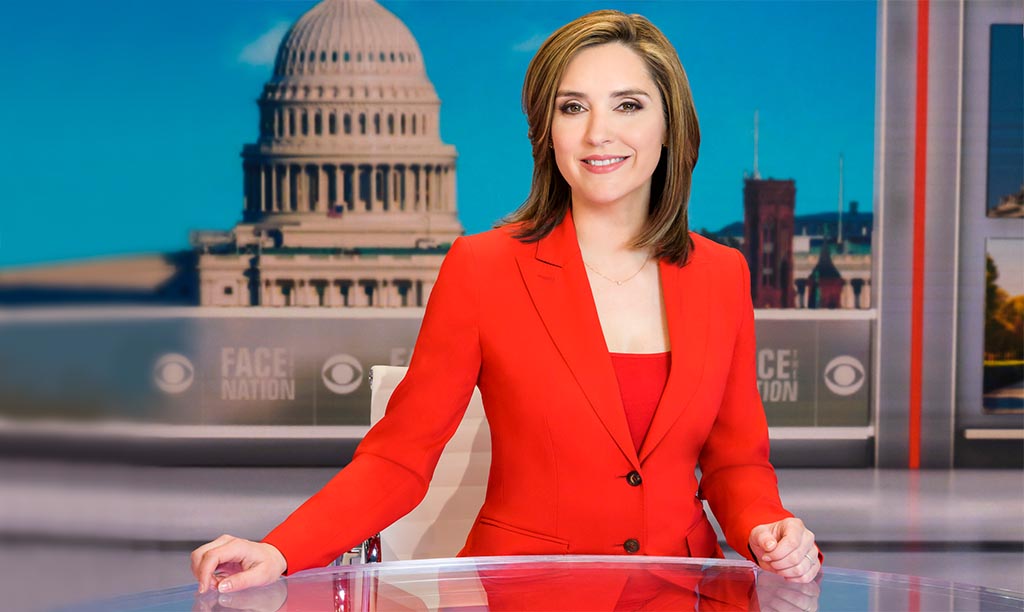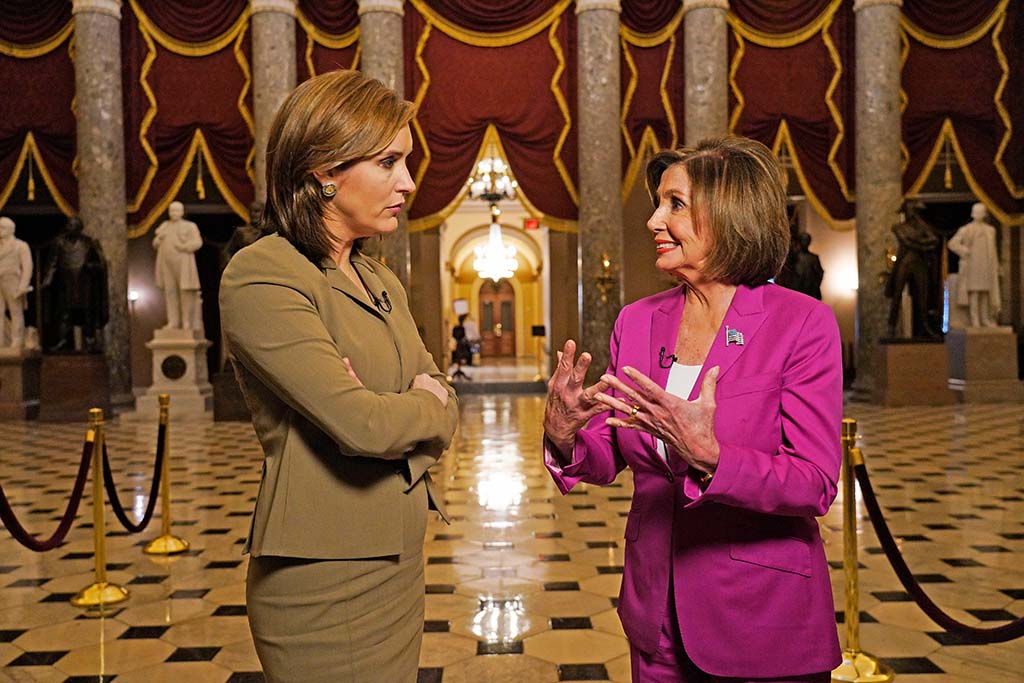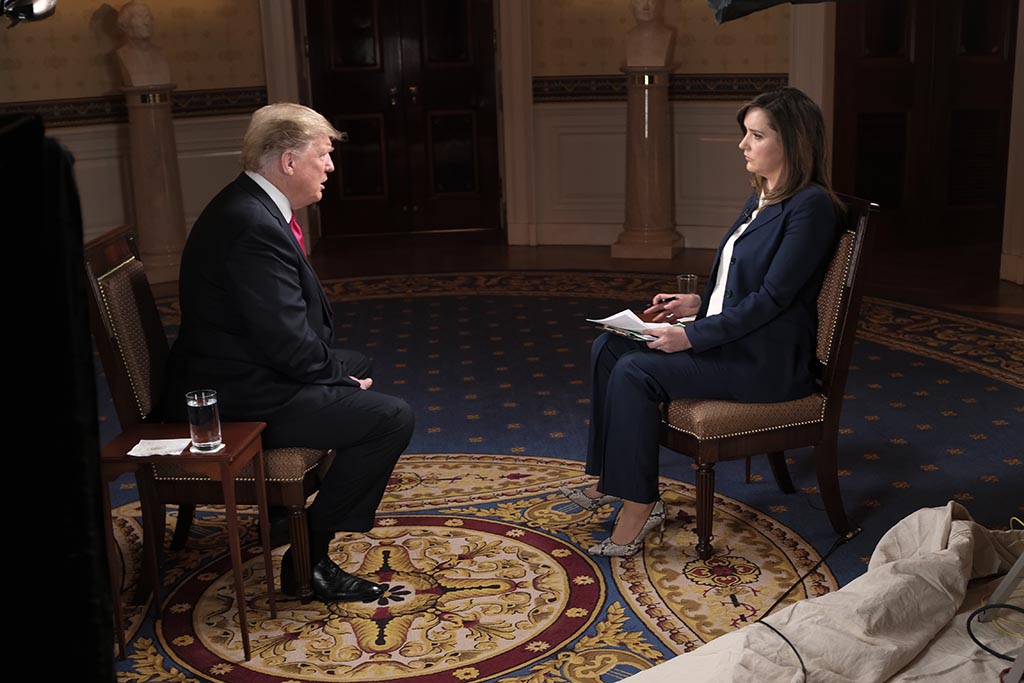Wonder Women of New York 2023: The ‘Face’ of Sunday Morning News
Woman of Influence Margaret Brennan reached five years in ‘Face the Nation’ moderator chair in February

The smarter way to stay on top of the multichannel video marketplace. Sign up below.
You are now subscribed
Your newsletter sign-up was successful
Margaret Brennan, moderator of Face the Nation, has been named 2023’s Woman of Influence by Multichannel News. Brennan became moderator of the CBS public-affairs program in 2018. She’s also chief foreign affairs correspondent at CBS News.
Brennan joined CBS News in 2012 and has been State Department and White House correspondent. Prior to that, she worked at Bloomberg Television and CNBC.
Brennan said the “amazing group of women” at Face the Nation has some serious influence. All three senior producers, Anne Hsu, Avery Miller and Carol Ross Joynt, as well as executive producer Mary Hager and tech manager Laura Foran, are women. “l do think of it as a group of wonder women behind Face the Nation,” Brennan said.
Based in Washington, Brennan will be celebrated at Multichannel News’s Wonder Women luncheon March 23 at the Ziegfeld Ballroom in New York. She spoke about covering the nation’s lawmakers and newsmakers the day after President Joe Biden’s State of the Union address. An edited transcript follows.

MCN: Is Face the Nation a different show during the Biden presidency than it was during Trump’s reign?
Margaret Brennan: I think the heart and soul of who we are is the same. In many ways, the end of the Trump presidency, during the pandemic, reminded us of who we are. And it gave me real clarity on who we need to be and the service that we need to provide. So I still try to keep that front and center, in my thinking and how I approach interviews and even just how we curate topics.
The momentum of the news hasn’t slowed too dramatically. There are still really huge issues that are not specific to the man in the office, but to where the world is at this moment. Those things still loom large. We are still doing a fair amount of national security and a lot less on health policy than during the worst of the pandemic, but we’re still trying to remain true to the value we provide in helping to keep people informed.
The smarter way to stay on top of the multichannel video marketplace. Sign up below.
MCN: Do you have a highlight going back over the last year or so, a moment that broke some major news or crystallized what the show’s all about?
MB: I had an interview in October [2022] right before the election with [House Majority Whip] Tom Emmer (R-Minn.), who was on the program talking about what was about to happen with the election. It was in this moment, right after Paul Pelosi had been attacked in his home and at the same moment that U.S. officials were warning us about the risk of political violence. And that just felt incredibly important.
I don’t like it when politics are covered like it’s ESPN — it’s not who’s up, who’s down, who won. These are people’s lives. The words we use and the way we use them, particularly at key moments, is so key. And that just felt like one of those moments.
I don’t like it when politics are covered like it’s ESPN — it’s not who’s up, who’s down, who won. These are people’s lives.”
— Margaret Brennan
I had a fairly tough exchange with [Emmer] about how he was communicating to fellow Republicans what is acceptable in terms of rhetoric, and the use of weapons specifically in social media — why do you need to put a gun in a political ad or in a tweet when the tweet has nothing to do at all with guns? All the veiled threats.
I think that was a moment that encapsulated a lot of where we were in terms of anxiety for the country.
On the cusp of the Russian invasion of Ukraine, I’m proud of how we covered that. And we’ve remained dedicated to covering that and all the parts of that conflict that impact the world — not just the battleground, but what’s happening in the economy, what’s happening with food security.
The week leading up to the conflict, I had a pretty tough exchange with the Russian ambassador, who was on February 20, saying, absolutely no invasion. And then four days later, there you go.
We had [Ukraine] President [Volodymyr] Zelenskyy on in April, and it was right after the Ukrainians had retaken the areas around Kyiv and the massacres in Bucha had just been discovered. We woke up that morning to a lot of the first images from that, and that was the same morning we had the president of Ukraine on. And he just was so passionate and angry about what he had just witnessed done to his people, having gone to those front lines and seeing it. The world was horrified at that moment. It was the very first time he used the term genocide to describe what was happening. It really focused in on what was happening, the idea of a land war in Europe in this moment, with that kind of brutality.

MCN: It’s five years for you in this role. Does it feel like five years?
MB: I think about the show in terms of my children, because I was pregnant with my first son when I got the job. It exhilarated and terrified me horribly in the same moment. [Laughs.] So when I hear it, I’m like, ‘gosh, my eldest son is literally in parallel to the show,’ and I think of the show as my child.
In many ways, it doesn’t feel like the baby’s that old. [Laughs.] It doesn’t feel like it has been that long. But if you look at the amount of history that we have covered in our five years, it’s pretty incredible. I certainly didn’t expect that. When I slipped into the moderator role, we were in the still very chaotic part of the Trump administration, pre-pandemic. I had been a White House correspondent for the Obama administration and the Trump administration, and I had gotten used to that frenetic pace. And I anticipated that for the show. But I didn’t anticipate the gravity of the world-changing events that we would cover.
In such a short period of time, the velocity of the news and the weight of what we were covering, with the worst global pandemic in a century, the misinformation/
disinformation that really cost people their lives, the racial justice protests that exploded in this capital city into violence and [the] January 6 [attack on the U.S. Capitol] having happened.
We thought we were in an incredibly intense news environment, and then it just kept picking up. So it feels like we’ve covered about a decade in five years. I probably have some gray hair from that.

MCN: How has the show evolved over your five years on it?
MB: I think that we have remained true to the sensibilities, the continuity. The executive producer, Mary Hager, has helped that to a large extent. I also just was making that transition from being a correspondent into the moderator, and I’d been an anchor before. But this was just a different kind of interview at a moment in time that has felt incredibly important. And so coming into a place of comfort with all of that, and figuring out how to do all of that and manage it in a way that isn’t overwhelming for our viewers, in a way that helps them better understand and at times when often we’re trying to understand it ourselves as we report it out, that takes time.
I feel like we did hit our stride during the pandemic, certainly, but continuing now. I feel like I’ve changed, but the sensibility of the show remains true to just that, those same foundational things we talked about when I stepped into it, which was context, perspective, civil conversation — things that I fundamentally believe we have to bring back as a country.
MCN: What do you do to unwind?
MB: Well, I have a 4-year-old and a 2-year-old and a pretty crazy job, so there’s not a lot of downtime. I work out. I try to spend my Mondays, which is my weekend, spend some quality time with my 4-year-old when he comes home from school because I don’t get him on weekends. While my older son’s at school, I spend time with my 2-year-old. It’s literally coaching my 2-year-old on how to say words.
MCN: I’m guessing you have a good green room story — two guests before the show, after the show, screaming at each other or coming to peace. Something we don’t get to see on the show.
MB: One of the things that I remember, it’s like embedded here as this oh-my-gosh moment, was having the secretary of defense, Lloyd Austin, who doesn’t do interviews very often; the Ukrainian ambassador to the U.S. [Oksana Markarova], who is a friend of the show; and the Chinese ambassador to the U.S., [Qin Gang], who is now the foreign minister. Huge bookings, but it was literally trying to avoid a diplomatic incident, having them in different parts of the building.
After my interview with the Chinese ambassador, where I was pressing him on his country not completely denouncing what had happened with Russia’s choices in attacking Ukraine, the Ukrainian ambassador buttonholed him on his way out.
That stood out to me. I was like, ‘Gosh, I really want to know what happened in that conversation while I was in the studio.’ ▪️
Michael Malone is content director at B+C and Multichannel News. He joined B+C in 2005 and has covered network programming, including entertainment, news and sports on broadcast, cable and streaming; and local broadcast television, including writing the "Local News Close-Up" market profiles. He also hosted the podcasts "Busted Pilot" and "Series Business." His journalism has also appeared in The New York Times, The L.A. Times, The Boston Globe and New York magazine.

